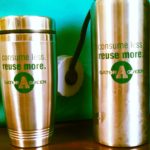Ban Bottled Water
 Make a habit of carrying your own reusable bottle or travel mug to reduce the waste and environmental impact associated with single-use bottles of water. Bottled water is falsely advertised as safer and better tasting than tap water, but research doesn’t back up this claim. Bottled water is 300 times more expensive than tap water even though most brands are actually just tap water that’s been filtered but less carefully regulated for quality. Even if you toss your bottles in a recycling bin, the production and transportation of those bottles already have a significant fossil fuel footprint.
Make a habit of carrying your own reusable bottle or travel mug to reduce the waste and environmental impact associated with single-use bottles of water. Bottled water is falsely advertised as safer and better tasting than tap water, but research doesn’t back up this claim. Bottled water is 300 times more expensive than tap water even though most brands are actually just tap water that’s been filtered but less carefully regulated for quality. Even if you toss your bottles in a recycling bin, the production and transportation of those bottles already have a significant fossil fuel footprint.
Save Water
Turn off the water when you’re not using it. Shorten your showers. Do only full loads of laundry.
Shop Smart
Many products require a lot of water to support their production, particularly in the textile industry. Think carefully about whether the environmental impact of an item is worth the amount of use you’ll get out of it. If it’s an item you’ll wear only a couple times or will only be in style or last for one season, keep looking for something that will hold up to regular rotation and seasons of wear. Or try shopping at thrift and consignment stores.
DIY
Many personal care products can be easily made in your kitchen for pennies compared to commercial products, which can be full of unregulated chemicals which may be harmful to our health (the skin absorbs 60 percent of everything we put on it) and the environment. These chemicals enter the environment and aquatic ecosystems when we wash them away (ultimately ending up in French Creek in Meadville). Check out our workshops to learn how you can make moisturizing sugar scrubs, switch to shampoo bars, or make batches of your own toothpaste with simple, safe, and environmentally friendly ingredients.
Cleaning
Instead of buying commercial cleaning products to keep your room or apartment clean, first try refilling a spray bottle with 1 part vinegar and 2 parts water. Vinegar is an effective disinfectant that’s also super cheap and far safer than commercial cleansers that include chemicals which may be harmful to our health and the environment. These chemicals enter the environment and aquatic ecosystems when we rinse them away (ultimately ending up in French Creek in Meadville). Check out our workshops to learn how you can infuse your vinegar spray with citrus, herbs, or essential oils and explore other natural cleansers such as baking soda.